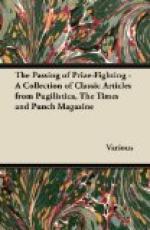STORICULES.
I.—The suicide-advertisement.
[Illustration]
As you stood before the automatic machine on the station platform, making an imbecile choice between a packet of gooseberry nougat and a slab of the gum caramel, you could not help seeing on the level of your eye this notice:—“Blacking-cream. Ask for HIGLINSON’S, and take no other.”
Similar announcements met you on every hoarding, in almost every paper and magazine, on every omnibus. Neat little packets of HIGLINSON’s Blacking-cream were dropped through your letter-box, with a printed request that you would honour Mr. HIGLINSON by trying it. Leaflets were handed you in the street to tell you what public analysts said about it, and in what great hotels it was the only blacking used. Importunity pays. Sooner or later you bought HIGLINSON’s Blacking-cream. You then found out that it was just about as good as any other, and went on buying it.
In one way this was very good for Mr. HIGLINSON, because he became very rich; in other ways it was not so good for him. For a long time he had nothing to do with public life; the public never thought about his existence; to the public he was not a man at all—he was only part of the name of the stuff they used for their boots. If he had introduced himself to a stranger, giving the name of HIGLINSON, it is probable that the stranger would have remarked jocularly, “No relation to the Blacking-cream, I presume?” HIGLINSON knew this, and it pained him deeply, for he was a sensitive man.
Because he was sensitive and felt things so much, he wrote a volume of very melancholy verses. He was unmarried and lonely, and he wanted to lead a high life. He said as much in his verses. But what comes well from Sir Galahad comes ill from the proprietor of a Blacking-cream; and—from idiotic notions about pluck and honesty—he had put his own name to his book. Unfortunately, those who feel much are not always those who can express much; and HIGLINSON could not express anything. So critics with a light mind had a very fine time with these verses. They quoted them, with the prefatory remark:—“The cream of the collection—perhaps we might say the Blacking-cream of the collection—is the following,” and they wound up their criticism with saying that the book must have been simply published as an advertisement. Mr. HIGLINSON could hardly have been mad enough to have printed such stuff from any other motive.




